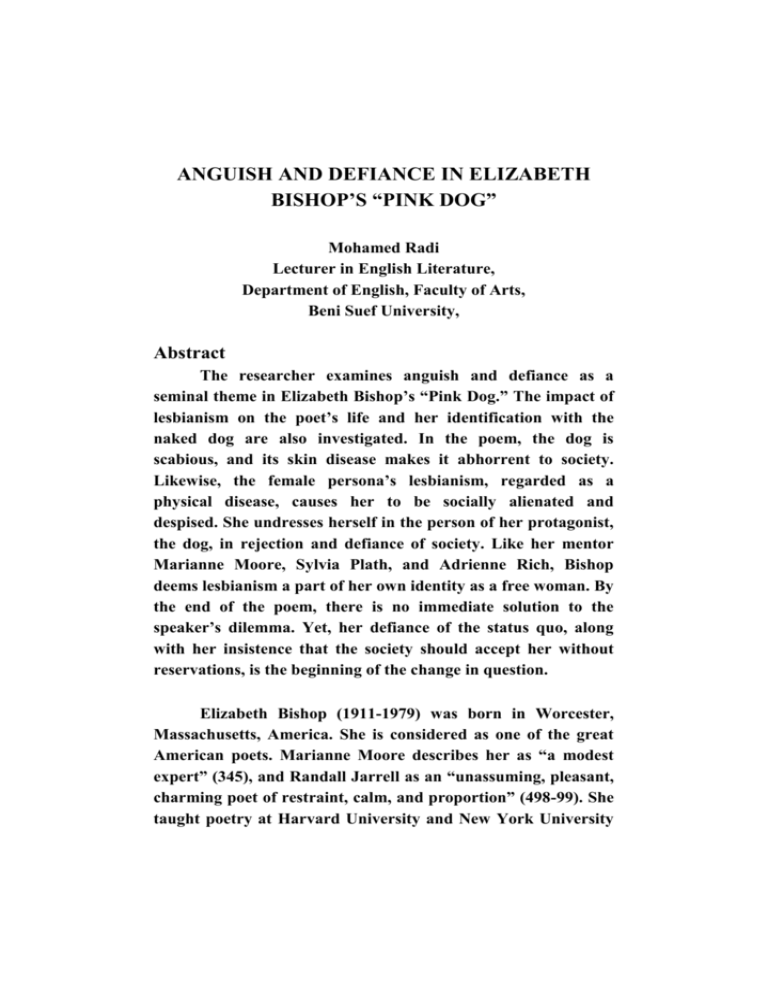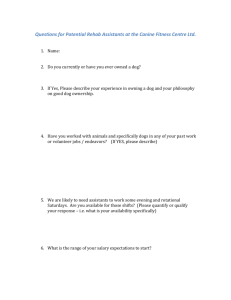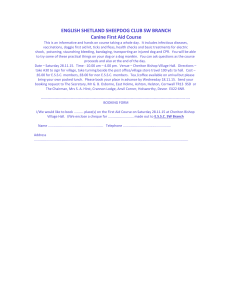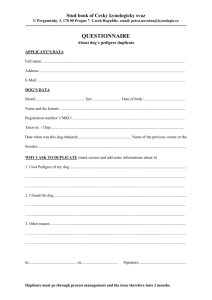
ANGUISH AND DEFIANCE IN ELIZABETH
BISHOP’S “PINK DOG”
Mohamed Radi
Lecturer in English Literature,
Department of English, Faculty of Arts,
Beni Suef University,
Abstract
The researcher examines anguish and defiance as a
seminal theme in Elizabeth Bishop’s “Pink Dog.” The impact of
lesbianism on the poet’s life and her identification with the
naked dog are also investigated. In the poem, the dog is
scabious, and its skin disease makes it abhorrent to society.
Likewise, the female persona’s lesbianism, regarded as a
physical disease, causes her to be socially alienated and
despised. She undresses herself in the person of her protagonist,
the dog, in rejection and defiance of society. Like her mentor
Marianne Moore, Sylvia Plath, and Adrienne Rich, Bishop
deems lesbianism a part of her own identity as a free woman. By
the end of the poem, there is no immediate solution to the
speaker’s dilemma. Yet, her defiance of the status quo, along
with her insistence that the society should accept her without
reservations, is the beginning of the change in question.
Elizabeth Bishop (1911-1979) was born in Worcester,
Massachusetts, America. She is considered as one of the great
American poets. Marianne Moore describes her as “a modest
expert” (345), and Randall Jarrell as an “unassuming, pleasant,
charming poet of restraint, calm, and proportion” (498-99). She
taught poetry at Harvard University and New York University
Mohamed Radi ـ ـــــــــــــــــــــــــــــــــــــــــــــــــــــــــــــــــــــــــــــــــــــــــــــــــــــــــ
and was also a Consultant in Poetry to the Library of Congress
in 1949-50. She won many prizes: the Houghton Mifflin Poetry
Award for her first volume North and South in 1946, the
Pulitzer Prize for Poems: North and South – A Cold Spring in
1956, the National Book Award for Questions of Travel in 1965,
the National Book Critics Circle Award for Geography III and
two Guggenheim fellowships as well as the Neustadt
International Prize for Literature in 1976. “Bishop continue[s]
to dominate the stories we tell about twentieth-century poetry . .
. because of the continuing power of [her] poems” (Longenbach,
“Between Reticence” 26).
Bishop visited and lived in many cities and countries. She
spent a long time in Brazil where she got involved in lesbian
relationships with two women. She spent fifteen years with the
Brazilian socialite and architect Lota de Macedo Soares. “When
it came to her own lesbian life,” Isa Golden notes, “the Vassareducated Bishop lived it to the fullest” as she was “consumed by
love and totally dependent on her lover, Lota” (Golden, 69).
With Lota, she started to enjoy life and to feel very secure. She
once called the years she spent with Rita the most productive
years in her life. “Her ‘home’ in Brazil with her lover Lota . . .
was perhaps the closest Bishop ever got to a sense of real
belonging” (Fan, 47).
Later on, Bishop’s relationship with Lota became very
stressful. Having found a new lover, Bishop decided to head
back for the United States. Suffering from depression, Lota
followed her and committed suicide in 1967 when Bishop did
not reciprocate her love. Bishop met Alice Methfessel in
1971.They lived together as lesbians until Bishop’s death in
74 ــ ــــــــــــــــــــــــــــــــــــــــــــــــــــــــــــــــــــــــــــــــــــــــــــــــــــــــــــــــــــــــــ
ـــــــــــــــــــــــــــــــــــــــــــــــــــــAnguish and Defiance in Bishop’s “Pink Dog”
1979. Bishop’s experience “of a lesbian identity,” argues
Adrienne Rich, enabled her “to perceive other kinds of
outsiders and to identify, or try to identify, with them” (127). It,
also, enabled her to masterfully express “intimate, low-voiced,
and delicate things” (Rosenbaum, 86).
The scholarship on Bishop’s “Pink Dog” is scanty and
rather inadequate. This research paper endeavors to analyze the
crucial theme of anguish and defiance which “Pink Dog”
embodies. It, also, traces the major causes behind the speaker’s
anguish and defiance in the poem which are due to the
humiliation and the rejection she faces at the hands of a
mercilessly biased society. The speaker’s identification with the
naked and pink dog, and the implication that both are lesbians,
are, also, underscored.
“Pink Dog” was published in 1979, but the poem was
probably written in 1963 or 1964 in Brazil. The setting is in Rio
de Janeiro during the Carnival festival. The tone is sardonic,
ironic, bitter, and defiant at one and the same time. The speaker
is anguished but refuses to be a victim or to be classified as a
social misfit. In terms of form, the poem is written in rhymed
tercets. The elaborate poetic form which Bishop uses in “Pink
Dog” and the rather superficial, social theme function as double
masks.
With these masks on, Bishop expresses her personal
anguish which is caused by her sexual propensity. Her feeling
of being sexually insulted and socially alienated urges her to use
the triple rhymed tercets to convince the society at large that
being lesbian does not subvert the dominant regime of
ــــــــــــــــــــــــــــــــــــــــــــــــــــــــــــــــــــــــــــــــــــــــــــــــــــــــــــــــــــــــــــ75
Mohamed Radi ـ ـــــــــــــــــــــــــــــــــــــــــــــــــــــــــــــــــــــــــــــــــــــــــــــــــــــــــ
heterosexual men and women; a lesbian can be in harmony with
them. This is apparent in the strict AAA rhyme-scheme which is
followed throughout the poem. The lines of the first stanza, for
example, end with “blue,” “hue,” and “avenue” (CP, 190). In
this regard, Margaret Dickie explains:
Bishop’s penchant for triple rhymed
tercets indicates an interest not just in
the difficulty of the rhyme scheme but
in the particular triangles it calls up,
as in ‘Pink Dog,’ which has a subtext
of sexual fury underneath its political
commentary. (2)
The poem starts with a detailed description of the
weather during the summer in Brazil. People are spending a
nice time on the beach:
The sun is blazing and the sky is blue.
Umbrellas clothe the beach in every hue.
Naked, you trot across the avenue.
(CP, 190)
Cloth is available in different colors and is enough to make
umbrellas that can cover and “clothe” the whole beach. The
many umbrellas turn the sand of the beach invisible, and signify
the presence of a large number of people. It is a very hot season;
the sun is “burning” and the sky is “blue,” and there are no
clouds. The addressee is unknown, but it may be understood
from the “[u]mbrellas,” “the beach,” and “[n]aked” that it is a
76 ــ ــــــــــــــــــــــــــــــــــــــــــــــــــــــــــــــــــــــــــــــــــــــــــــــــــــــــــــــــــــــــــ
ـــــــــــــــــــــــــــــــــــــــــــــــــــــAnguish and Defiance in Bishop’s “Pink Dog”
woman who is being described. Surprisingly, the reader realizes,
now, that the addressee is a dog. Mena Mitrano argues:
Unlike her mentor, Marianne Moore, Bishop
does not use animal allegory to suggest the
possibility of a gentler world; rather she uses
it to point to a self-censoring process, to
intimate guarded, even muzzled , speech
about the possibility of positing a female
subjectivity against the grain of the page. . . .
Bishop’s female dog . . . is not simply a dog
but a signifier that keeps the poem (and us)
oscillating between two semantic clusters;
‘woman’ and ‘dog’. (35)
Aware of the surroundings, the stark “naked” dog “trot[s]”
across the street while determined to show her nakedness to the
people around. With nothing to cover up her body, she
challenges people. The insistence of “Pink Dog” on the dog’s
nakedness with the ugliness that it might have is strongly
suggestive of the dog’s / woman’s rage that is both physical and
sexual. It, also, reflects her deep-rooted insistence on
challenging the “social conventions” and on refusing
“invisibility” (Cucinella, 75).
Bishop describes the dog in the following stanza “with a
remarkable eye for detail” (J.Elkins, 43). She is bare and free
from hair. She is, also, self-confident; she does not fear the
burning sun or the passersby:
Oh, never have I seen a dog so bare!
ــــــــــــــــــــــــــــــــــــــــــــــــــــــــــــــــــــــــــــــــــــــــــــــــــــــــــــــــــــــــــــ77
Mohamed Radi ـ ـــــــــــــــــــــــــــــــــــــــــــــــــــــــــــــــــــــــــــــــــــــــــــــــــــــــــ
Naked and pink, without a single hair …
Startled, the passersby draw back and stare.
(CP, 190)
The interjection, “[o]h,” shows how amazed the speaker is when
she sees the naked dog. “Never” indicates that this is the first
time in her life that she has seen such a creature in total
nakedness. Bishop heightens the dog’s nakedness by using
“bare,” “naked,” and emphasizes it with the prepositional
phrase “without a single hair.” This justifies the passersby’s
horror at seeing the dog. The emphasis on nakedness raises the
dog to the level of a human being and most certainly to that of a
woman as her body is “without a single hair.” This depiction
strengthens the link between the female speaker in the poem
and the dog. It seems that the dog is a woman in disguise. As
Marilyn Lombardi points out, Bishop “project[s] her most
intense feelings into a variety of poetic protagonists in order to
escape stifling categorization and conventional definitions of
identity” (153).
On seeing the naked dog, the passersby are not only
horrified, but are also attracted to her. They “stare” because
they do not expect a dog to be stark naked. Yet, the society does
not allow or acknowledge her because she is naked, and her skin
is pink -- the color associated with scabies. They keep staring at
and retreating from her in horror. They are afraid of getting
infected. It is not rabies or scabies that the poet cares for.
Actually, she uses both terms so as to refer to something else.
These diseases highlight a physical problem as sexual affairs are
associated with the body.
78 ــ ــــــــــــــــــــــــــــــــــــــــــــــــــــــــــــــــــــــــــــــــــــــــــــــــــــــــــــــــــــــــــ
ـــــــــــــــــــــــــــــــــــــــــــــــــــــAnguish and Defiance in Bishop’s “Pink Dog”
The speaker’s suffering as well as the dog’s is unbearable.
“Pink dog and speaker appear as two rival aspects of the self –
one that would parade its nakedness, whatever the
consequences, and one that would cover and protect, since it
cannot or does not wish to expel, the body” (Costello, 88). Both
the woman and the dog can be regarded as one being. The
seemingly-warring aspects of this lesbian woman show the
severe impact of societal conservatism on her. She internally
suffers and panics as the society alienates her:
Of course they’re mortally afraid of rabies.
You are not mad; you have a case of scabies
But look intelligent. Where are your babies?
(CP, 190)
The physical symptoms which are mistaken for “scabies” and
“rabies,” horrify the passersby and, by implication, the society
at large. Rabies and scabies keep the dog alienated and socially
despised. This socially rejected “eyesore” of a dog, obviously
suffering from infectious diseases, is the focal point that Bishop
highlights. The physical oddity is the cause of the dog’s
alienation. The diseased body of the dog metonymically reflects
the speaker’s disease of lesbianism, and will cause her to be
alienated, too. She has no place in this patriarchal society.
Bishop uses the third person, plural pronoun “they” to
keep herself at a distance from society and to argue that it does
not care about her or about the dog which represents her; it is
indifferent and biased against the scabious dog / lesbian woman.
The fear that makes the society tremble is so high that the
society does its best to eradicate the disease. The adverb
ــــــــــــــــــــــــــــــــــــــــــــــــــــــــــــــــــــــــــــــــــــــــــــــــــــــــــــــــــــــــــــ79
Mohamed Radi ـ ـــــــــــــــــــــــــــــــــــــــــــــــــــــــــــــــــــــــــــــــــــــــــــــــــــــــــ
“[m]ortally” indicates that the society considers it a matter of
life or death to combat the physically and sexually diseased dog /
woman so as to protect its own stability which is endangered by
her presence.
The speaker is fully convinced that she would not be
considered infectiously mad if she works on her physical
problem. This is further clarified by the rhetorical question
“[w]here are your babies?” According to the inherited and
bequeathed dogmas, a woman should be the right source for
getting “babies.” She should not be attracted to the same sex,
but to the other. Her lesbianism would not offer the society any
new generations. The epidemic should be contained by
ostracizing lesbians. The society does not regard her sexual
inclination as a personal freedom, but as a deviation from the
norm.
The word “babies,” which closes the rhymed tercet
above, is very suggestive as it implies the presence of a woman
as the subject of the poem. It reinforces the notion that the
woman identifies with the dog. A woman, not a dog, can “look
intelligent”:
(A nursing mother, by those hanging teats.)
In what slum have you hidden them, poor bitch,
While you go begging, living by your wits?
(CP, 190)
The reference to the “hanging teats” is a reminder that the dog
is female. The reference is, also, to the lower part of the body
with the adjacent sex organs. Here, the speaker is hinting at
80 ــ ــــــــــــــــــــــــــــــــــــــــــــــــــــــــــــــــــــــــــــــــــــــــــــــــــــــــــــــــــــــــــ
ـــــــــــــــــــــــــــــــــــــــــــــــــــــAnguish and Defiance in Bishop’s “Pink Dog”
lesbianism, the sexual inclination that causes the dog/ woman to
suffer. The poet places the first line of the stanza above in
parentheses to assure that the society expects the role of a
mother from the dog / woman. This is her job in the society. To
be part of the society, she should be like Sylvia Plath’s woman
who is sarcastically described in her poem “The Applicant” as a
machine whose job in society is to “bring teacups and roll away
headaches / And do whatever you tell it” This machine is
appreciated and respected by a patriarchal society when “it can
sew, it can cook, / It can talk, talk, talk” (221-22).
Ironically speaking, the poet uses the derogatory word
which the society uses, “bitch.” “[P]oor,” the modifier that
precedes the word “bitch,” pinpoints the poet’s sympathy for
the naked dog in a misogynist society which does not offer her
enough leeway to practice her sexual orientation without fear or
shame. She does not have to stoop or use her skills and wits to
beg for respect and for personal freedom from her society. If
she does not use her “wits,” she will lose her status in the society
as a woman worthy of dignity and respect.
Moreover, Bishop creates bonds with the other alienated
groups in society. She uses the alienation and the injustice which
the poor suffer from to show how unfair her society is. She
associates her cause with a general one so as to win victory for
hers:
Didn’t you know? It’s been in all the papers,
to solve this, how they deal with beggars?
They take and throw them in tidal rivers.
ــــــــــــــــــــــــــــــــــــــــــــــــــــــــــــــــــــــــــــــــــــــــــــــــــــــــــــــــــــــــــــ81
Mohamed Radi ـ ـــــــــــــــــــــــــــــــــــــــــــــــــــــــــــــــــــــــــــــــــــــــــــــــــــــــــ
Yes, idiots, paralytics, parasites
Go bobbing in the ebbing sewage, nights
out in the suburbs, where there are no lights.
(CP, 190)
Her bitter advice to the dog is emphasized with the rhetorical
question, “Didn’t you know?” The tense used in the question is
the past simple tense which is indicative of past actions inherited
by one generation after another. The bias and animosity of the
society against deviant and defiant members are widespread.
Also, the way the society deals with those who have a different
sexual inclination, shows how conservative it is. “They,”
referring to the guardians of the social conventions, throw
eccentric members into “tidal rivers” to get rid of them forever.
They “bob” up and down on the strong waves of these rivers
and are left there to sink and die. No help is offered to them.
Bishop makes her cause broad enough to include all the
marginal, despised and helpless in a prejudiced society. The
sexual deviants along with “idiots,” “paralytics,” and
“parasites,” face tough conditions and severe alienation. They
are not allowed any rights and are restricted to living in the
dirtiest places. “Sewage” is where the society keeps them stuck.
The sweeping darkness as there are “no lights” pinpoints the
endeavor of the society to ignore and eradicate these defiant
members.
The society goes far in its animosity against the dog /
woman. It allows her little room for any respect or sympathy:
If they do all this to anyone who begs,
82 ــ ــــــــــــــــــــــــــــــــــــــــــــــــــــــــــــــــــــــــــــــــــــــــــــــــــــــــــــــــــــــــــ
ـــــــــــــــــــــــــــــــــــــــــــــــــــــAnguish and Defiance in Bishop’s “Pink Dog”
drugged, drunk, or sober with or without legs,
what would they do to sick, four-leggèd dogs?
(CP, 190)
Bishop uses the pronoun “they” and associates it with
everything biased, horrible and unfair. The treatment which the
dog/woman receives at the hands of a merciless society is
anticipated. If “they” chase “anyone who begs,” it would chase
the “four-legged” dog, a “bitch” and a source of infection to
death or destruction. Similarly, a woman is not acceptable if she
breaks the rules by openly exhibiting her sexual inclination. The
rhetorical question “what . . . dogs?” that ends the stanza shows
the mercilessness of the patriarchal society.
Deep inside, the poet knows that she is sexually different
from the other dogma-worshipping members. Her case as well
as the dog’s is unique:
In your condition you would not be able
even to float, much less to dog-paddle
Now look, the practical, the sensible
solution is to wear a fantasía.
Tonight you simply can’t afford to be an
eyesore. . . . (CP, 190-91)
The bitter advice which Bishop unleashes to the naked and pink
dog to “wear a fantasia” is caused by the unfair treatment
meted out to her by a prejudiced society. She uses her own
weapons of disguise to survive in a society which welcomes the
false. In the meantime, she shows the society its ugly face and its
ــــــــــــــــــــــــــــــــــــــــــــــــــــــــــــــــــــــــــــــــــــــــــــــــــــــــــــــــــــــــــــ83
Mohamed Radi ـ ـــــــــــــــــــــــــــــــــــــــــــــــــــــــــــــــــــــــــــــــــــــــــــــــــــــــــ
ineffective standards. With the different, sexual inclination
which the dog / woman has, her chances for acceptance into this
society are low. But they can be enhanced if the dog/woman
searches for an immediate solution which can be both “practical
and sensible.”
At the Carnival festival in Brazil, “[n]aked” and “pink,”
the dog is easily recognizable as an alien creature. She
represents an oddity which is both physical and sexual and
which is obviously unwelcome among the people around. To
mingle with devoted society members and to avoid being “an
eyesore,” she has to wear a mask in order to shield herself
against their contempt. No one will discover her true identity
behind her make-up. Her identity would also be unknown as no
one would expect her to be a “dog.” They would think she’s a
normal woman, because the animal in her –her lesbianism – will
sink deep beneath the surface which her make-up secures.
It is the speaker’s sense of eccentricity that makes her
reluctantly advise the dog to wear a “costume’ and “dress up”.
Like the dog, she is part and parcel of the struggle and, of
course, cannot disentangle herself. Bonnie Costello explains:
The poet writes from the margin, on
the divide between culture and
nature. It is her empathy for the pink
dog, her own sense of marginality,
that provokes her terrible advice. In a
culture which abhors the body’s
mutability, disguise is the only
84 ــ ــــــــــــــــــــــــــــــــــــــــــــــــــــــــــــــــــــــــــــــــــــــــــــــــــــــــــــــــــــــــــ
ـــــــــــــــــــــــــــــــــــــــــــــــــــــAnguish and Defiance in Bishop’s “Pink Dog”
alternative
to
expulsion
annihilation. (85-86)
or
It is socially inappropriate for anyone – the dog / woman
included-- to wear make-up or “mascara” during the time of
Ash Wednesday as it is a religious event:
But no one will ever see a
dog in mascara this time of the year.
Ash Wednesday’ll come but Carnival is here.
What sambas can you dance? What will you wear?
(CP, 191)
Bishop uses “mascara” to further reinforce the idea that the
addressee in “Pink Dog” is not only a dog, but also a woman. A
woman can reason time for festivals, “dance” sambas and select
what to wear. She tries to hide the ugliness which the society
sees in the naked dog by advising her to put on some “mascara”
because the society will not accept her as she is. It will accept
and acknowledge her if she modifies herself to suit the norms
and values it requires its members to respect. This reflects the
wide gap between what is false and what is real in society. The
standards it respects are false, and only the false would be
acceptable.
In other words, the dog has to hide her own ugliness to
get accepted and acknowledged in the society. She has to
disguise herself in mascara. Ash Wednesday does not offer the
naked dog / lesbian woman much freedom, but another
alternative is secured, the Carnival festival. It is common in
ــــــــــــــــــــــــــــــــــــــــــــــــــــــــــــــــــــــــــــــــــــــــــــــــــــــــــــــــــــــــــــ85
Mohamed Radi ـ ـــــــــــــــــــــــــــــــــــــــــــــــــــــــــــــــــــــــــــــــــــــــــــــــــــــــــ
carnivals that all restrictions – dogmas, customs and traditions
– are suspended. So, it is a golden chance for the dog / woman to
mitigate her anguish by enjoying full freedom and equality with
the members of the society while keeping her sexual inclination
underneath the outer mask. Mikhail Bakhtin points out that at
the Carnival:
The official life, monolithically serious
and gloomy, subjugated to a strict
hierarchical order, full of terror,
dogmatism, reverence, and piety [is
replaced with] the life of the carnival
square, free and unrestricted, full of
ambivalent laughter, blasphemy, the
profanation of everything sacred, full
of debasing and obscenities, familiar
contact
with
everyone
and
everything. (129-130)
But in Bishop’s “Pink Dog,” the Carnival festival is not as free
from rules as it is expected to be. The presence of strangers has
ruined it:
They say that Carnival's degenerating
--radios, Americans, or something,
have ruined it completely. They're just talking.
(CP, 191)
The rules which are supposed to be ignored at the Carnival are
strictly observed as it is not as free as it should be. There are
strangers from other countries, the “Americans.” Here, Bishop
86 ــ ــــــــــــــــــــــــــــــــــــــــــــــــــــــــــــــــــــــــــــــــــــــــــــــــــــــــــــــــــــــــــ
ـــــــــــــــــــــــــــــــــــــــــــــــــــــAnguish and Defiance in Bishop’s “Pink Dog”
broadens the net to include herself as one of the outsiders. She,
also, assures herself and the naked dog that the Carnival is not a
good occasion on which she can exhibit her sexual preference as
a lesbian. She will be considered as a social misfit for the
Carnival has been ruined. “The problem with carnival is that it
is one of those hyperbolic concepts that can always go over into
their opposites” (Pechey, 129).
The speaker ironically reinforces the idea that the
Carnival is “always wonderful,” but:
A depilated dog would not look well.
Dress up! Dress up and dance at Carnival!
(CP, 190)
“[D]epilated” is a word which is suitable for describing a
woman, not a dog. Bishop uses “depilated” to describe the dog
to strengthen the reciprocal relationship between the dog and
herself. Ironically, the society would consider a woman who is
lesbian as pervert as a dog that has no hair. Both are considered
misfits and deeply repugnant. The imperative “[d]ress up!”
followed by the exclamation mark, reflects the society’s
dominance as well as the speaker’s anguish and defiance.
Cheryl Walker argues that “people still argue about whether
the recommendation the speaker gives to the dog to “dance at
Carnival” is to any degree serious” (118).
Dressing up is impossible for the lesbian woman as she
regards it as abandonment of her sexual inclination and a kind
of surrender to the will of the society. To dress up is to admit
that she has something ugly that she should cover. The poet
ــــــــــــــــــــــــــــــــــــــــــــــــــــــــــــــــــــــــــــــــــــــــــــــــــــــــــــــــــــــــــــ87
Mohamed Radi ـ ـــــــــــــــــــــــــــــــــــــــــــــــــــــــــــــــــــــــــــــــــــــــــــــــــــــــــ
repeats the imperative “Dress up and dance at carnival!” This
time, she couples it with “dance” which is the target result.
“Dance” is suggestive of the full freedom and communal joy
that the members of the society share. It, also, works as allure
for the naked and pink dog / lesbian woman to abandon her
sexual preference by masking her lesbian identity. Nonetheless,
“the temporary cure or cover-up of Carnival” (Fortuny, 32)
would not end, or even mitigate, her anguish.
In “Pink Dog,” the dog and the woman are linked
through their gender and through their disease that both inhere
in the body. Here, as Margaret Dickie explains, we see “the
hysteria of a woman who has been sexually insulted. She finds
company in the diseased dog and makes that dog stand for her
own sense of misuse” (13). The anguish and isolation the lesbian
woman undergoes are the factors which hurt her, and suppress
and demolish her feeling of relatedness to the society.
Nonetheless, she gets very determined and very defiant as she
purposefully faces the society with her body completely
uncovered.
In conclusion, “Pink Dog” offers no clear-cut answers or
effective solutions to end the speaker’s dilemma, mitigate her
anguish and make her feel welcome in the society as a member
worthy of dignity and respect. The temporary solutions offered
in the poem can be beneficial for a lesbian woman, ready to
abandon or at least conceal her sexual proclivity, and accept the
values of the society without questioning them. The poet calls
for “franker confessions and more forceful politics”
(Longenbach, Modern Poetry, 9). “Her last line ‘Dress up! Dress
88 ــ ــــــــــــــــــــــــــــــــــــــــــــــــــــــــــــــــــــــــــــــــــــــــــــــــــــــــــــــــــــــــــ
ـــــــــــــــــــــــــــــــــــــــــــــــــــــAnguish and Defiance in Bishop’s “Pink Dog”
up and dance at Carnival!’ suggests a stinging indictment”
(Walker, 119) of a heterosexual society.
Anguish and defiance continue, for the speaker is
determined to be accepted as she is without any modifications or
wearing any masks. She believes that her lesbianism is not
something ugly she has to hide. As Liz Yorke put it, “to be
lesbian is to be a ‘self-chosen woman’, to be a woman who has
said ‘no’ to the fathers’” (79). More fuel is added to the conflict
between the woman with her lesbianism on the one hand, and
the society with its inherited values on the other. She is not
willing to sacrifice her lesbianism, nor is the society ready to
acknowledge her as a legitimate member. Her revolt “against
the oppressive designs of patriarchy” (Erkkila, 145) is the best
transcendence she can achieve.
ــــــــــــــــــــــــــــــــــــــــــــــــــــــــــــــــــــــــــــــــــــــــــــــــــــــــــــــــــــــــــــ89
Mohamed Radi ـ ـــــــــــــــــــــــــــــــــــــــــــــــــــــــــــــــــــــــــــــــــــــــــــــــــــــــــ
WORKS CITED
Bakhtin, Mikhail M. Problems of Dostoevsky’s Poetics. Ed. and
trans. Caryl Emerson.
Intro. Wayne C. Booth.
Minneapolis: University of Minnesota Press, 1989.
Bishop, Elizabeth. The Complete Poems: 1927 – 1979. New
York: Farrar, Straus, and Giroux, 1991.
Costello, Bonnie. Elizabeth Bishop: Questions of Mastery.
Cambridge: Harvard UP, 1991.
Cucinella, Catherine. “‘Dress up! Dress up and Dance at
Carnival!’: The Body in Elizabeth Bishop’s ‘Pink Dog’.”
Rocky Mountain Review of Language and Literature 56. 1
(2002): 73-83.
Dickie, Margaret. “Text and Subtext.” South Atlantic Review 59.
4 (Nov. 1994): 1-19.
Erkkila, Betsy. The Wicked Sisters: Women Poets, Literary
History, and Discord. Oxford: Oxford UP, 1992.
Fan, Kit. “Imagined Places: Robinson Crusoe and Elizabeth
Bishop.” Biography 28.1 (Win. 2005): 43 – 53.
Fortuny, Kim. Elizabeth Bishop: The Art of Travel. Colorado:
University Press of Colorado, 2003.
90 ــ ــــــــــــــــــــــــــــــــــــــــــــــــــــــــــــــــــــــــــــــــــــــــــــــــــــــــــــــــــــــــــ
ـــــــــــــــــــــــــــــــــــــــــــــــــــــAnguish and Defiance in Bishop’s “Pink Dog”
Golden, Isa. “A Touch of the Poet.” Advocate (11 Apr.
2006):69+.
Jarrell, Randall. “The Poet and His Public.” Partisan Review 13.
4 (1946): 488 – 500.
J.Elkins, Mary. “Elizabeth Bishop and the act of Seeing.” South
Atlantic Review 48. 4 (Nov., 1983): 43-57.
Lomabardi, Marilyn May. “The Closet of Breath: Elizabeth
Bishop, Her Body and Her Art.” Twentieth century
Literature 38 . 2 (Sum. 1992): 152-175.
Longenbach, James. “Between Reticence and Revelation.” The
Nation 24 Nov. 2008. 25+
--- . Modern Poetry After Modernism. Oxford: University
Press, 1997.
Mitrano, Mena. “Bishop’s Pink Dog.” Explicator 54. 1 (Fall
1995): 33-36.
Moore, Marianne. “A Modest Expert.” The Nation 28
Sept.1946: 354.
Pechey, Graham. Mikhail Bakhtin: The Word in the World.
London and New York: Routledge, 2007.
Plath, Sylvia. The Collected Poems. Ed. Ted Hughes. New York:
Harper and Row Publishers, 1981.
ــــــــــــــــــــــــــــــــــــــــــــــــــــــــــــــــــــــــــــــــــــــــــــــــــــــــــــــــــــــــــــ91
Mohamed Radi ـ ـــــــــــــــــــــــــــــــــــــــــــــــــــــــــــــــــــــــــــــــــــــــــــــــــــــــــ
Rich, Adrienne. Blood, Bread, and Poetry: Selected Prose 1979 –
1985. New York: Norton, 1994. 124 – 135.
Rosenbaum, Suzan. “Elizabeth Bishop and the Miniature
Museum.” Journal of Modern Literature 28. 2 (Win.
2005): 61-99.
Walker, Cheryl. God and Elizabeth Bishop: Meditations on
Religion and Poetry. New York: Palgrave Macmillan,
2005.
Yorke, Liz. Adrienne Rich: Passion, Politics and the Body.
London: Sage, 1997.
92 ــ ــــــــــــــــــــــــــــــــــــــــــــــــــــــــــــــــــــــــــــــــــــــــــــــــــــــــــــــــــــــــــ
” Anguish and Defiance in Bishop’s “Pink Dogـــــــــــــــــــــــــــــــــــــــــــــــــــــ
األنين و التحدي في قصيدة اليزبيث بيشوب "الكلبة الجرباء"
محمد راضي محمد متولي
مدرس األدب اإلنجليزي
كلية اآلداب -جامعة بني سويف
ملخص البحث
يتناول الباحث بالتحليل موضوع األنين و التحدي في قصيدة اليزبيث بيشوب
"الكلبة الجرباء" ،كما يناقش مثلية الشاعرة (االنجذاب إلى نفس الجنس) و توحدها
مع شخص الكلبة حيث تظهر الكلبة عارية تماما ً من الشعر و على جسدها أثار مرض
الجرب؛ مما يجعل منظرها منفرا ً لمشاهديها ،و بالمثل ،فإن المرأة التي تخاطب الكلبة
في القصيدة (الشاعرة ذاتها) تعاني من المثلية التي يعتبرها المجتمع مرضا ً جسديا ً
معديا ً كجرب تلك الكلبة ،مما يجعله يحتقرها و يتبرأ منها و يعزلها عن باقي أعضائه
المحافظين على قيمه.
و قد خلص الباحث إلى أن الشاعرة تعري نفسها أمام المجتمع لتتحداه
ولتسخر من قيمه الزائفة ؛ ألنها تؤمن بأن مثليتها جزء ال يتجزأ من هويتها و حريتها
كامر أة عصرية .كما يبين الباحث أنه ال يوجد حل جذري و فوري لمشكلة المرأة في
القصيدة ،و لكن ثورتها على الوضع الراهن هي البداية الصحيحة لتغيير قيم المجتمع
المتشدد من وجهة نظرها مما يتيح لها مستقبالً الحصول على اعتراف و قبول غير
مشروط كعضو جدير باالحترام في هذا المجتمع.
93ــــــــــــــــــــــــــــــــــــــــــــــــــــــــــــــــــــــــــــــــــــــــــــــــــــــــــــــــــــــــــــ










